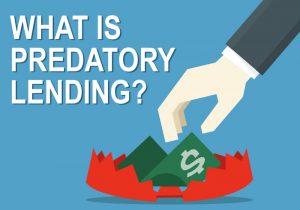(ThyBlackMan.com) After the nation gives thanks for its many blessings, the annual season of holiday joy begins with its barrage of celebrations both secular and spiritual that mark the season. Colorful decorations and Christmas trees pop up at parades, concerts, parties and more as family and friends gather in good cheer.
For many businesses, the holidays are also the difference between ending the year in profits or in red ink. So there are also an abundance of advertisements, circulars and commercials beckoning each of us to offer loved ones a special token of the season. From Black Friday discounts, to Cyber Monday sales, to the perennial Christmas Eve bargain sales, merchants hope their cash registers will ring nonstop this season.
But the holiday season is also a time when predatory lenders offer enticements to put more debt than money into your pockets. For unsuspecting consumers, it’s a temptation trapped in all kinds of packages that seem too good to pass by. In reality though, these deals are often a debt trap leading to a holiday financial hangover that can last well into the New Year.
If you believe pre-paid debit cards are insurance against financial rip-offs, think again.
Some prepaid cards may be a helpful way to avoid overspending. But before paying cash for this convenient form of plastic, read all of the fine print that explains the terms and fees that come with its usage. Terms and options can and do vary significantly. Many include a range of fees from activation, to learning your current balances, reloading monies and in some cases fees for inactivity. Some prepaid cards even use tricky tactics that allow consumers to inadvertently overspend the value on the card and incur an overdraft fee. By the time all applicable fees are assessed, the amount of money actually available on that prepaid card can shrink and shortchange how far it can help on purchases.
Another debt trap, overdraft fees, are marketed and sold as a ‘customer convenience’. Yet in truth, these fees can run up holiday bills that many consumers will not know about until after New Year. Their trick is for the bank to extend credit when transactions exceed monies actually available in accounts – including debit card point-of-sale transactions, and ATM withdrawals which banks could easily decline at no charge when consumers lack sufficient funds. Instead, some banks often accept the transaction, putting the customer in the red and charging a steep $35 per overdraft fee. Additionally, some banks alter the posting of transactions in an effort to maximize revenues. In 2017, customers of several large banks paid over $11 billion in overdraft fees in just one year.
Consumers most vulnerable to these high-cost fees are those who have little or no cushion in their checking accounts. Consumers who may have accepted overdraft “coverage” still have a right to cancel the so-called costly service by directing their institutions to remove it.
“With abusive overdraft fees, financial institutions take advantage of customers fighting desperately to stay afloat,” said Rebecca Borné, a senior policy counsel with the Center for Responsible Lending. “Ultimately, these fees drive many from the banking system altogether and make reentry very difficult.”
Data from the Federal Deposit Insurance Corporation (FDIC), back up Borné’s claim. Over half a million households who once had bank accounts became unbanked— primarily due to high or unpredictable fees like overdraft.
Other consumers, beckoned by the brightly-colored signs advertising “fast cash” or “bad credit? No problem”, should just keep walking or driving past storefronts of payday and car-title loans. These predatory loans often lead to consumers paying more in interest and fees than for the money borrowed. They ultimately wind up costing consumers $8 billion in fees in states where they are legal.
Research by the Center for Responsible Lending (CRL) has found that predatory payday loans alone drain $4.1 billion in fees from consumers annually — borrowers who typically are unable to fully repay the original loan, usually due in two weeks’ time. With average annual interest rates of 391%, three out of every four payday loans go to borrowers with more than 10 loans a year.
Although the typical payday loan averages $357, a car title loan provides more cash, averaging about $1,000 but must be secured with an owned car as collateral. Failure to make on-time payments often leads to the loss of the vehicle –even though the loan may only be a fraction of the vehicle’s marketable value. While the lender holds on to a car title, the borrower is faced with triple-digit interest and, one of every five cases — a whopping 20% percent — end up losing their personal transportation.
In recent years, activist ministers and clergy have emerged as some of the most vocal consumer advocates on payday and car-title loans.
“American consumers are now in the death grip of a government that is not only deaf to the cries of the poor for fundamental economic justice, but this government is also blind to their merciless exploitation by payday lending traffickers,” said Rev. James T. Golden of Florida. “Consumers don’t need payday loans; they need financial stability,” added Rev. Dallas Lenear, director of Project GREEN in Grand Rapids. “And, payday loans keep them unstable. Scripture says, ‘Do not exploit the poor because they are poor…’ (Prov. 22:22) But, that is precisely what payday loans do.”
All forms of predatory lending bring the probability of robbing low-to-moderate income consumers of their holiday joy. This holiday season try adding a full measure of practical sense to help your dollars preserve the spirit and joy of the season – it only comes once a year!
Written by Charlene Crowell
Official website; http://twitter.com/charlenem2

















Leave a Reply